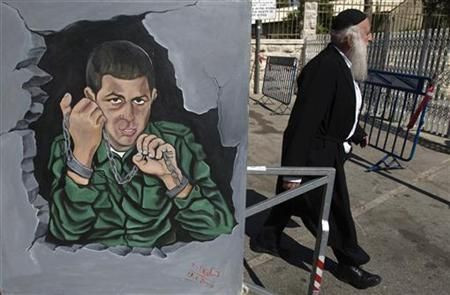Israeli-Palestinian Prisoner Exchange Begins

A long-awaited prisoner exchange between Israel and Hamas began before dawn Tuesday when the first of hundreds of Palestinian inmates were bused from their jails to border crossings where they will be swapped for captured Israeli soldier Gilad Shalit.
The first phase of the exchange, expected to take several hours, will end a saga that has gripped Israelis over the five years of Shalit's captivity in Gaza.
A long and heavily guarded convoy left a prison in Israel's southern Negev desert where the majority of inmates had been held. A small group of female prisoners departed from a second jail in the center of the country.
Most prisoners will be taken to the Kerem Shalom crossing that borders Egypt and the Hamas-run Gaza Strip. Others will be released in the West Bank.
Egypt, which helped broker the deal, will receive Shalit from his Hamas captors and hand him over to Israel at the same time as the 477 Palestinians are officially released.
The deal received a green light from Israel's Supreme Court late Monday after it rejected petitions from the public to prevent the mass release of prisoners, many serving life sentences for deadly attacks.
Shalit, now 25, was abducted in June 2006 by militants who tunneled into Israel from the Gaza Strip and surprised his tank crew, killing two of his comrades. He has since been held incommunicado and was last seen looking pale and thin in a 2009 video shot by his captors.
Upon his release, Shalit will be flown by helicopter to an air base in the center of Israel where he will be greeted by Prime Minister Benjamin Netanyahu and reunited with his family. Later he will fly to his home in northern Israel.
In the second phase of the swap, expected to take place in about two months, a further 550 Palestinian prisoners will be freed, officials said.
HIGH PRICE
The repatriation of captured soldiers, alive or dead, has long been an emotionally charged issue for Israelis. Most have served in the military as conscripts and see it as sacrosanct. But they also feel stung by the high price they feel Israel is paying for Shalit.
I understand the difficulty in accepting that the vile people who committed the heinous crimes against your loved ones will not pay the full price they deserve, Netanyahu wrote in a letter, released by his office, to bereaved Israeli families.
Hamas prepared a heroes' welcome in Gaza for 295 of those due to be sent to the coastal territory. Palestinians regard those jailed by Israel as prisoners of war in a struggle for statehood. Israel has some 6,000 Palestinian prisoners.
Hamas spokesman Sami Abu Zuhri called the point that the prisoners left their jails a historic moment.
Of the prisoners, 41 will be exiled to Turkey, Qatar and Syria.
Israel, which withdrew troops and settlers from Gaza in 2005, tightened its blockade of the coastal territory after Shalit was seized and taken there.
The deal with Hamas, a group classified by the United States and European Union as a terrorist organization over its refusal to recognize Israel and renounce violence, is not expected to have a direct impact on efforts to revive Middle East peace talks.
Palestinian President Mahmoud Abbas, a Hamas rival, has been pursuing U.N. recognition of Palestinian statehood in the absence of negotiations with Israel that collapsed 13 months ago in a dispute over settlement-building in the occupied West Bank.
(Additional reporting by Rami Amichai, Ronen Zvulun, Ari Rabinovitch and Nidal al-Mughrabi and Douglas Hamilton in Gaza and Tom Perry in Ramallah; Editing by Matthew Jones)
© Copyright Thomson Reuters 2024. All rights reserved.





















